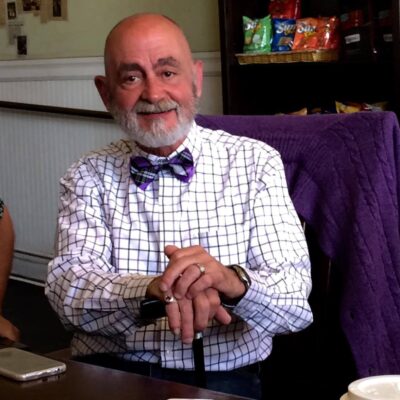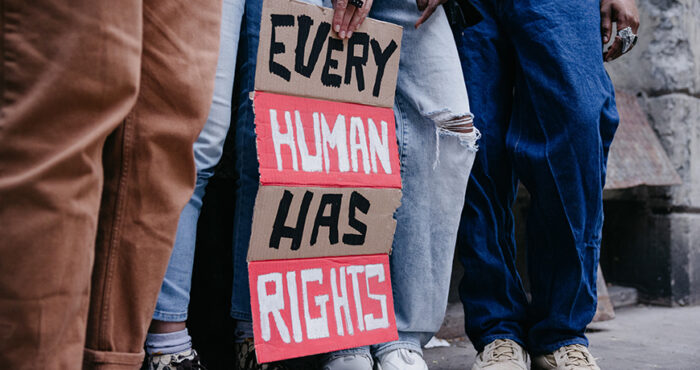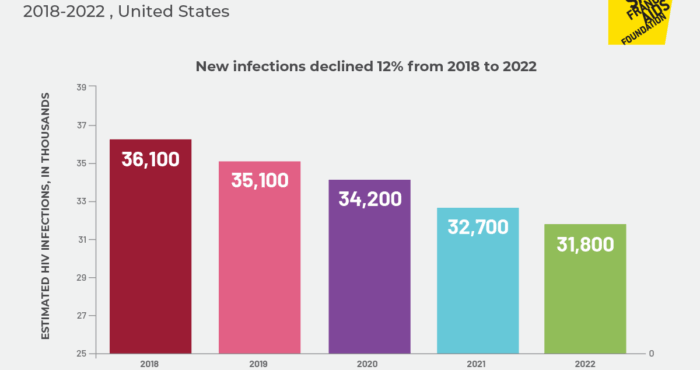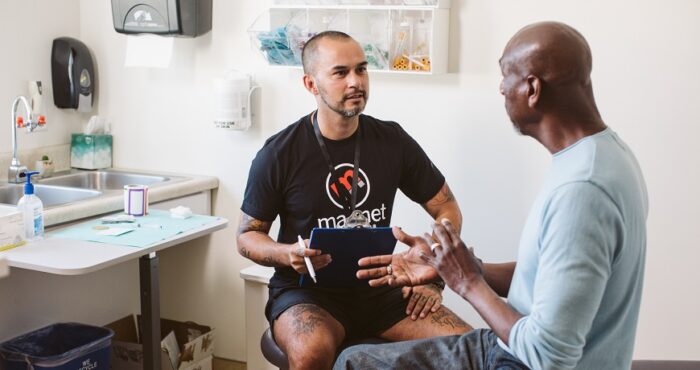Why are we still here when so many of our friends and lovers died?
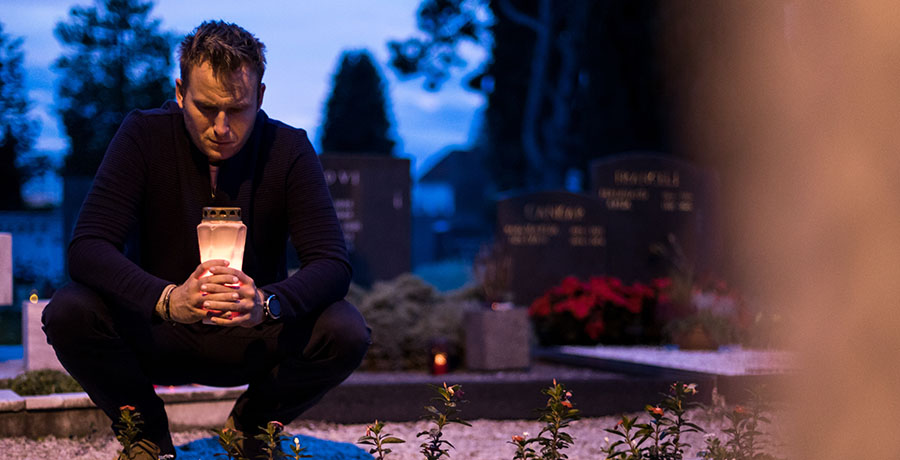
As HIV Long-Term Survivor Awareness Day approaches (it’s on June 5 every year), I’ve been thinking about a question that most of us have been asked at some point during the last forty years: Why do you think you are still here when so many of our friends and lovers died as a result of AIDS-related causes?
The first several times I got that question, I thought it was unbelievably rude and accusatory — as if I somehow contributed to my friends’ deaths; as if I should be drowning in survivors’ guilt for not dying when those friends died; as if my continuing survival were a betrayal of those friends or an insult to their memories.
After all, the question seemed to be saying, you got the same death sentence that they got. How dare you outlive the people you loved?!
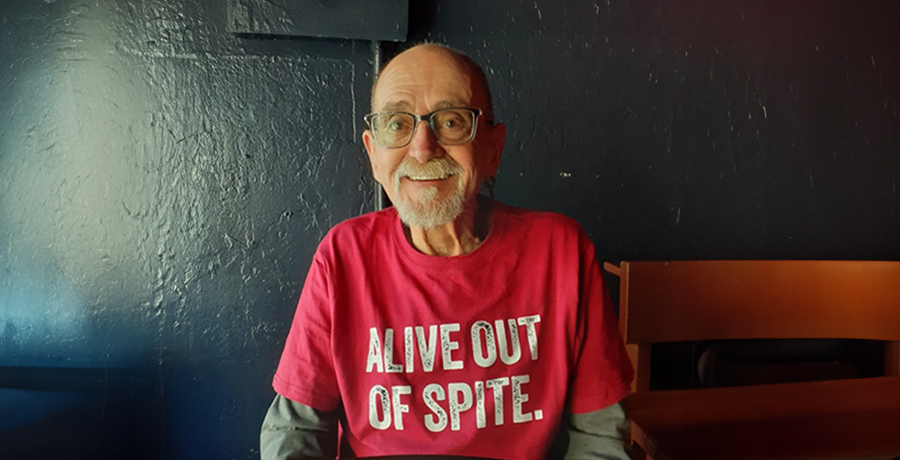
I wanted to know how other long-term HIV survivors would answer that question, so I turned to my friends in a writing group comprised of both HIV-positive and -negative survivors of the worst years of the AIDS plague, sponsored by Honoring Our Experience, a program of the Shanti Project. Since the earliest days of the Covid-19 pandemic, the group has gathered every Thursday night to write and to read and respond to each other’s writing. At a recent session, I posed the why are you still here? question as a writing prompt. Of the sixteen responses, four stood out.
Harry Breaux, a 79-year-old man diagnosed with HIV in 1980, and AIDS in 1996, is a stalwart activist who has been involved in the fight for LGBTQ+ rights since the 1970s; he is also a published writer and advocate for long-term survivors.
In December 1996, Harry collapsed at home, immobile with a very high fever. Afflicted with three deadly illnesses at once, a doctor gave him only a 50/50 chance of surviving the illnesses. “It was at that point,” Harry wrote, “that I realized I had to let go and give in to the inevitable probability that what had taken all my friends and so many, many others, was finally knocking on my door. I gave up. I felt the relaxation come into all my limbs and rest and quiet come into my mind. I went to sleep thinking this would be my last and I was at peace.”
However, instead of dying, he continued to wake up, morning after morning, and realized that, no, he was not going to die just yet. “For years I had lived under the assumption that one day it would happen,” Harry continued. “I’d be walking along and like so many I had seen around, I’d begin to notice lesions or breathing difficulty or unfathomable fatigue or glandular failures or blindness or this or that. Now in the actual throes of thinking it was over, unlike my peers, I was conquering the impossible.” During that three-week hospital stay, the question Why did you survive? was there, “hovering like a hawk circling its carrion.”
Harry attributes his survival to “chemistry and incredible timing.” The HAART cocktail had just become available, and he started treatment immediately. “I feel being a vegetarian, supplement-swallowing, exercising individual probably helped strongly. I also feel spending years in consciousness exploration played a part also. But no matter what theories, reasons, excuses or magic I attribute it to, my survival of the AIDS plague always comes down to a simple “I don’t know why” and the best I can distill this accomplishment into is that “it just isn’t my time….yet.”
Likewise for pediatrician Stephen G. Rosenbaum, M.D., surviving HIV can be chalked up to luck. “There but for the grace of God,…” he wrote, “Or, maybe, because something greater than me wanted me around to accomplish something that I wasn’t smart enough to realize then.”
He was at work when he received the news of his diagnosis from his internist. “I cried briefly, realizing that I wouldn’t be able to watch my nieces or my patients grow up. Then, after wiping my eyes and composing myself, I left my consultation room, and started seeing my afternoon patients,” reflecting his determination to carry on no matter.
When he started taking AZT, he managed not to suffer the horrid side effects and complications from the new drug. He also “participated in every drug study that came along and was also fortunate in the timing that occurred which matched my viruses drug resistance to new drugs availability. Talk about one of the few times in my life when I happened to be in the right place at just the right time.”
When he reflects on his 37-years relationship with the virus, “I think of it somewhat like the beast in “Alien”. It is permanently and inexorably living and changing inside of me, always reminding me, every time, every day, when I take my meds. Both of us for our own reasons, want to survive.”
Stephen rejoiced upon learning that he is undetectable and cannot pass on the virus through sexual contact. But he regards this undetectability a “’safe landing zone’ that I’m on as something always subject to change… It’s a contract that can be called in at any moment. That realization makes me very much want to live my life now.” Living now entails continuing his work as a pediatrician and as an advocate, “[t]o pass along to the young, the information that I have personally gleaned from this horrible illness… Here I am, almost 37 years into this relationship with a virus which has become my fellow traveler. Almost 37 years which I never figured I would have had. Years full of wonderful moments and awful moments. All of that forces you to be a little easier on yourself and, hopefully, more generous with others.”
Joanie Juster, a columnist for the SF Bay Times, is one of San Francisco’s fiercest, most resolute, and most active allies, a presence, sometimes at the forefront, sometimes behind the scenes, in nearly every AIDS-related protest, celebration, and memorial for 37 years. Although HIV-negative herself, like all the other HIV-negative long-term survivors, she endured the same losses, the same grief, the same fears, the same chaos as all of us who lived through the Plague years of the 1980s and ’90s.
The first reason she cites for still fighting for and with us reminds us that shared experience: “Is it because the massive collective trauma we underwent in the 1980s and 90s ripped a hole in my heart so huge that it would never heal?” She also credits her sense of honor (“for 37 years I’ve been naively vowing that I would be helping ‘until there’s a cure’…I don’t like making promises I can’t keep”) and her OCD (“I simply don’t know how to quit”). Why is she still here fighting? Let Joanie sum it up:
“Back in the day, friends and family would ask me how I could do such hard, heartbreaking work as helping people with what was then a hopeless, terminal disease. My answer then was: How could I NOT help them? The thing is, not all of them died. Some of them managed to hang on long enough for life-saving treatments to come along. Some of them managed to go on to live full lives, and are now facing new challenges, as the world has never seen a generation growing older with HIV, and doesn’t quite know what to do about it. They still need allies. They still need people who remember when, and who care. They still need people like me… As long as I am alive, I’ll still be here to help, to support, to bear witness, to remember, to love.”
Carole M. Fowler’s relationship with the AIDS pandemic is particularly heartbreaking. Her much-beloved son Scott lost his battle with AIDS in 1992. The pieces that Carole writes every Thursday mesmerize the other writers and often leave them in silent, understanding tears. She seems to be on a mission, not only to keep Scott’s memory alive, but to share Scott’s gifts with the rest of us. She writes about Scott because “Scott still touches people today in a myriad of ways. He appears through a thin veil as though he is alive. His life stories are relevant as each event is related with emphasis on the excitement, the depth of emotions, the gifts he bestowed generously, his determination to live each day with enthusiasm wherever he was, with whomever he was with. He taught us, his family, his friends, how to live fully and how to die gracefully.”
By sharing Scott’s story, Carole hopes to enable long-term HIV survivors and others to “create a transformation of teaching truths, of changing laws, to create, hopefully, a future of non-judgmental acknowledgments of LGTBQ individuals. A future of being free from ignorant bias. A future of being respected for who they are.” She refers to those lost to AIDS as “the soldiers of a horrific war who were sacrificed,” but tells us, “You are the soldiers today.” For Scott and his loving mother.
As for me, for the longest time I answered that question by assuring the questioner that my survival has been due to sheer serendipity, pure luck of the draw. I could have been any of those friends whom I lost, and I’m shocked that I didn’t die along with them. But I’ve come to realize that maybe my survival wasn’t so serendipitous after all; it wasn’t all just pure dumb luck. Like Harry and Stephen, I managed to hang on from my diagnosis, in 1989, until the HAART cocktail came along in 1996. But I no longer think it was luck that saved me.
I now believe that there is only one word that expresses why I have survived.
SPITE. Pure, unmitigated spite.
Some background: When I was five years old, in 1958, I underwent experimental open-heart surgery. Before mine, this particular operation had been tried on only two other children — and both of them died during the surgery. The surgeon gave my parents only a 50-50 chance that I would live through the operation. They told my parents (with me in the room, listening) that even if the surgery were a roaring success, “your son is going to die before he’s fifteen.” So I spent the next ten years expecting to keel over and die at any moment.
And then in 1989, when I was 36, I was diagnosed with HIV and was given two years to live. Obviously, I’ve been given a few extensions of that timeline, but I continue to live with both death sentences hovering over my head like the proverbial sword of Damocles.
And it pisses me off! Here’s where the spite comes in. Doctors have been telling me since I was five years old that I was going to die in the almost-immediate future. When I was diagnosed in 1989, I didn’t get sad or scared, I got angry as hell. How dare these doctors or anyone else presume to tell me when I’m going to die! How dare they! When I die is MY decision, not theirs. I’ll show these know-it-alls — I ain’t dying until I say I’m dying, on my terms, on my timeline. After all, I’m a Capricorn — like any goat, I never lose my footing and I will eat a path through anything that gets in my way. Death sentences are just more gourmet fodder to fuel my spite.
So, that’s my answer to the question, why are you still alive?
Spite. All-consuming, relentless, red-hot flaming spite.
No one tells me when it’s time for me to die.






